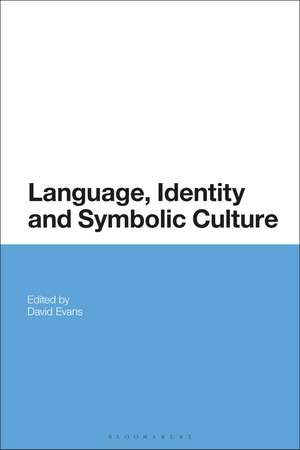Language, Identity and Symbolic Culture
Editat de David Evansen Limba Engleză Paperback – 27 noi 2019
| Toate formatele și edițiile | Preț | Express |
|---|---|---|
| Paperback (1) | 232.17 lei 6-8 săpt. | |
| Bloomsbury Publishing – 27 noi 2019 | 232.17 lei 6-8 săpt. | |
| Hardback (1) | 775.02 lei 6-8 săpt. | |
| Bloomsbury Publishing – 30 mai 2018 | 775.02 lei 6-8 săpt. |
Preț: 232.17 lei
Preț vechi: 265.77 lei
-13% Nou
Puncte Express: 348
Preț estimativ în valută:
44.43€ • 46.50$ • 36.98£
44.43€ • 46.50$ • 36.98£
Carte tipărită la comandă
Livrare economică 31 martie-14 aprilie
Preluare comenzi: 021 569.72.76
Specificații
ISBN-13: 9781350141629
ISBN-10: 1350141623
Pagini: 296
Dimensiuni: 156 x 234 mm
Greutate: 0.41 kg
Editura: Bloomsbury Publishing
Colecția Bloomsbury Academic
Locul publicării:London, United Kingdom
ISBN-10: 1350141623
Pagini: 296
Dimensiuni: 156 x 234 mm
Greutate: 0.41 kg
Editura: Bloomsbury Publishing
Colecția Bloomsbury Academic
Locul publicării:London, United Kingdom
Caracteristici
Offers an understanding of the opportunities of political and cultural emancipation created through language and open discourse
Notă biografică
David Evans is a Fellow in Education in the Education Faculty at Liverpool Hope University, UK.
Cuprins
Part I: Language and Identity: A Theoretical Perspective1. Introduction, David Evans (Liverpool Hope University, UK)2. Meaning; from inner structure to post-structure, David Evans (Liverpool Hope University, UK)3. Discourse Formation, David Evans (Liverpool Hope University, UK)Part II: Urban Discourses4. "DFLs" versus "Locals": Discursive Conflict on Social Media and the Battle for Regional Identity, Christopher Anderson (Canterbury Christchurch University, UK)5. Youth Identities: Media discourse in the formation of youth identity, Patricia Giardiello (Manchester Metropolitan University, UK)Part III: Marginalized Discourse6. Language - Culture: Marginalisation or Opportunity in Cameroon's official 'state bilingualism', Henry Kum (Liverpool Hope University, UK)7. Refugee Communities: The disappearance of voice and impact on care and identity, Henry Kum (Liverpool Hope University, UK)8. Subalternity, Language and Projects of Emancipation: An Analysis of Dalit Literature, Joseph M.T. (University of Mumbai, India)9. Mandarin Chinese in Education and Society in Xinjiang, Mamtimyn Sunuodula (Durham University, UK)Part IV: Pedagogical Discourse10. Cultural Discourses in the Foreign Language Classroom: economic opportunity, instrumental motivation or cultural understanding, David Evans (Liverpool Hope University, UK)11. Teacher Development through Classroom Discourse Analysis: The Self Evaluation of Teacher Talk (SETT) instrument developed by Walsh (2007), Karin Zotzmann (University of Southampton, UK)12. Conclusion: A pedagogy for marginalized language-culture, David Evans (Liverpool Hope University, UK)Index
Recenzii
Essential for graduates and postgraduates who seek to venture into analyzing how languages are interwoven with identities and cultures ... This edited book is of high importance and interest for researchers in various fields, such as linguistics, discourse analysis, media studies, cultural studies, and education, among others.
This is an important piece of work, which highlights the complexities of the field, arguing for systematic and sensitive exploration of language as a social justice issue.
This is an important piece of work, which highlights the complexities of the field, arguing for systematic and sensitive exploration of language as a social justice issue.
